Kidney Stones
What are Kidney Stones?
Kidney stones are formed from the minerals and salts in the urine which clump together when the urine becomes highly concentrated.
Normally these stones are only small and pass through the urinary tract without causing any problems.
What are the Causes of Kidney Stones?
Doctors are still unsure why kidney stones develop. However, factors which seem to impact on the development of the condition include:
- Lack of hydration (Highly concentrated urine)
- Poor diet high in animal proteins
- High sodium diet
- Obesity or weight gain
- Overactive parathyroid gland
- Type 2 diabetes

Kidney and ureteric (urinary tract) stone
What are the Symptoms of Kidney Stones?
Patients suffering from kidney stones may experience a range of symptoms. For example:
- Severe pain at the site of the affected kidney
- Pain radiating from the affected kidney to the groin
- Frequent or sudden urge to urinate
- Nausea and vomiting caused by pain
- Blood in the urine
- Feeling unwell with fevers/chills/rigors (“shivers or shakes”)
How are Kidney Stones Diagnosed?
If Dr Kim suspects that you are suffering from kidney stones he will perform an appropriate evaluation. You will also be asked to provide a urine sample and blood tests which will be checked for infection, blood in the urine, or any kidney damage as well as basic metabolic screening.
Depending on the results of these tests, you may need to undergo a low dose CT scan so that your doctor can examine the internal images of your kidneys, ureter, and bladder in more detail looking for stones. This is the most accurate test available to diagnose stones.
Sometimes, the diagnosis is made unexpectedly when the patient is being investigated for an unrelated medical condition. Dr Kim will advise you if your stone needs to be treated.
What are the Different Types of Kidney Stones?
Kidney stones come in many different types, shapes and colours. There are four main types of stones:
Calcium stones
Form when calcium combines with another mineral substance (oxalate, phosphate, carbonate) within the kidney. These stones can typically be seen on a plain x-ray. It is the most common type of kidney stone (>75%).
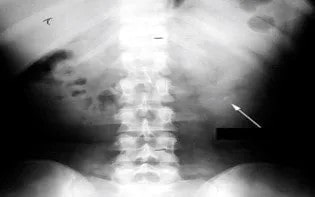
Stones Visible on Plain KUB X-ray
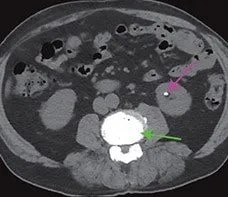
Stone Visible on CT KUB
Uric acid stones
Form in acidic urine (pH 5-6) and are difficult to detect on a traditional x-ray image.
Infection or struvite stones
Form as a result of urinary tract infections (UTIs) and can grow to a very large size in a short period of time. These stones can damage and disrupt how the kidney functions. They are typically seen on a plain x-ray forming a cast of the drainage system of the kidney.
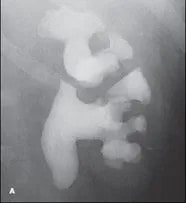
Staghorn Stones on Plain KUB X-ray
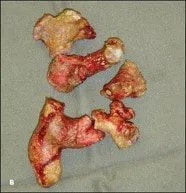
Extraction of Staghorn Stones
Cystine stones
Form as a result of a rare genetically inherited abnormality from both parents. Patients who are affected tend to be diagnosed at a young age and develop recurrent kidney stones throughout life. These stones are only faintly visible on x-ray.
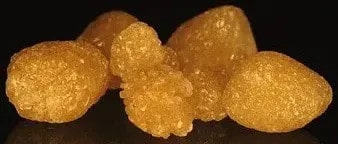
Gross Appearance of Cystine Stones
What are the Risks if Kidney Stones are Left Untreated?
It is important to treat kidney stones as they can cause severe pain, infection, and kidney failure, which require immediate medical attention.
If you are in extreme pain, or develop fevers, chills or rigors (“shivers or shakes”) as a result of kidney stones, you should seek urgent emergency treatment.
What are the Treatment Options for Kidney Stones?
The options available for the treatment of kidney stones depends on the type of stone that is present, the severity of the symptoms, and the location of the stone.
Treatment options include:
- Waiting for stones to pass out spontaneously; this is most suitable for smaller sized stones
- Medication to help assist in relaxing the ureter to aid stone passage
- Pain relief during stone passage
- Surgery to fragment or extract the stone
Surgery may be needed to unblock the kidney and remove a stone from the ureter or kidney if:
- The stone fails to pass
- The stone is too big
- The pain is severe
- The stone is affecting your kidney function
- The stone is affecting your employment
- There is a need for immediate treatment (ie kidney failure, infection)
- You are considering getting pregnant
In case of complex, recurrent stones (in particular cystine stones which often relapse), a lifelong commitment is required with a trusted team of medical specialists, supervised by urologist and nephrologist. Long term management involves close surveillance, ongoing educational support, urinary alkalinisation, oral fluids, and in many instances lifelong medications.
Dr Kim can talk to you about the treatment options and help you find the most suitable procedure.
Medications Used to Treat Kidney Stones
There are medications to help with passing a kidney stone that is causing a blockage but these are considered only on a case-by-case basis. It remains controversial regarding its effectiveness.
In certain situations, a tablet called tamsulosin (Flomaxtra) may be beneficial in helping relax the ureter to assist the stone to pass. It works best for stones that are lower down in the ureter. Pain relieving medications may also be required to assist during this time.
How Can I Prevent Stones from Recurring?
The type of stone you have will determine your stone management. There is no “one-size-fits-all” prescription for preventing kidney stones. General measures in kidney stone prevention revolve around being well motivated to not having another stone, maintaining a healthy lifestyle and normal weight range, keeping up fluid intake, reducing animal protein intake and decreasing salt in the diet.
General recommendations for stone prevention include:
- Maintaining a normal calcium intake( having two servings of dairy each day) is important to help bind and remove stone forming crystals in the gut before they get into the kidney
- It should be noted that calcium stones are usually not due to an excessive intake of dietary calcium so no calcium restriction
- Increasing fluid intake to dilute the urine so stones do not begin to form. It is recommended that you drink at least 10 cups (250mL) or 2.5 litres of fluid a day . Ideal fluid choices include water with citrate (lemon or lime) and carbonated mineral water beverages. The aim is to consume fluids low in sugar and calories to produce urine that is pale yellow in colour.
- Reducing excessive protein intake. As a general recommendation, your daily protein intake should be no more than 350 grams per day of beef, poultry, fish or pork. As a general rule, meat that fits the palm of the hand equals 100 grams.
- Maintaining a healthy body weight for your build. A body mass index range of 19 to 25 is considered healthy.
- Decrease salt (sodium) intake as the more salt your kidneys filter, the more calcium is formed in the urine. Excess calcium in the urine can lead to the formation of stones as they bind with other minerals. You should consume less than 2000 mg/ day of sodium. This is equivalent to one teaspoon of salt per day.
- In summary “Eat from each food group daily, animal proteins in moderation; plenty of fruit and vegetables; drink plenty of fluids; and have a diet low in salt”
